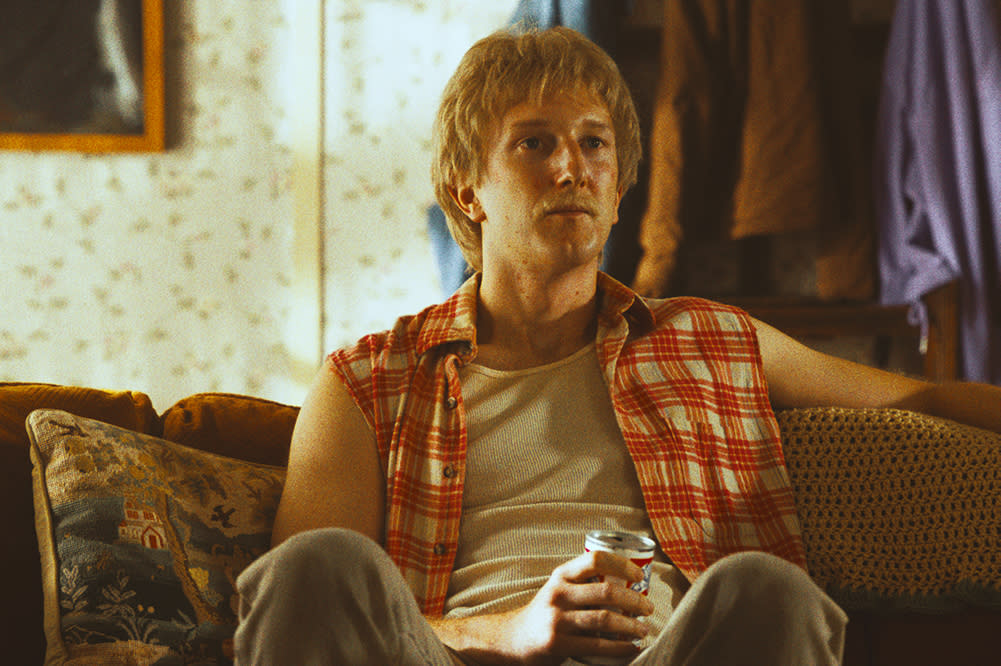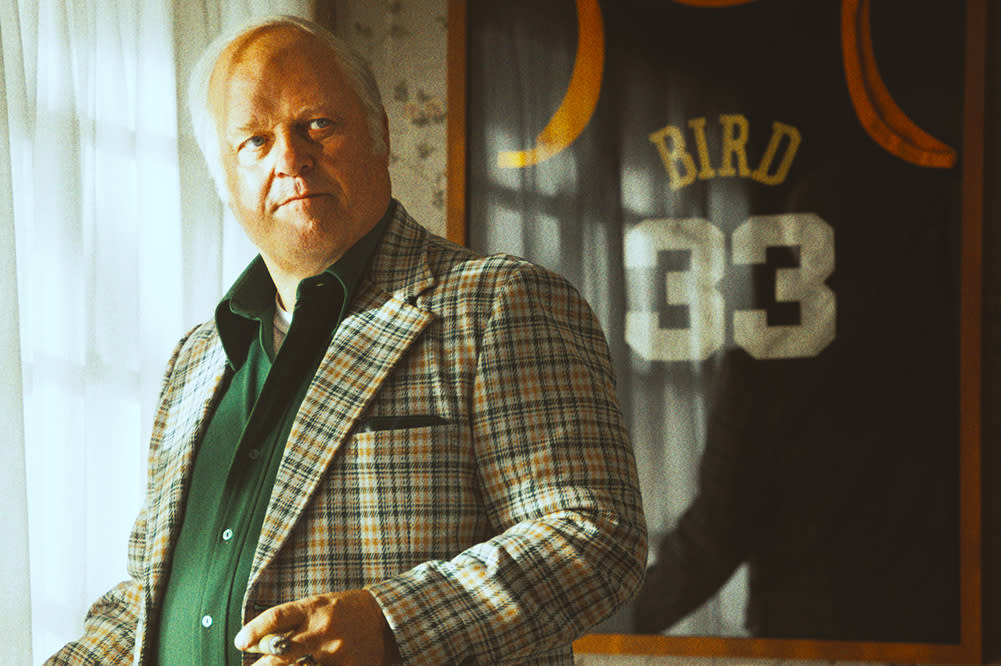‘Winning Time’: Michael Chiklis and Sean Patrick Small Talk Bringing Humanity to Larry Bird’s Villain Origin Story

SPOILER ALERT: This article discusses the Episode 3 of HBO’s “Winning Time: The Rise of the Lakers Dynasty” Season 2, now streaming on Max.
After being unceremoniously bounced in the first round of the 1981 NBA playoffs, the spirits of the Los Angeles Lakers sink even further in the cold open of this week’s “Winning Time.” Unable to defend the championship, the team can only seethe in their living rooms as they watch the dreaded Boston Celtics take home gold.
More from Variety
'Only Murders in the Building': How Alfred Hitchcock Inspired Mabel's Season 2 Look
'RuPaul's Drag Race' Season 15 Winner Sasha Colby Dreams of Starring in a Rom-Com With a Trans Lead
How 'House of the Dragon' and 'The Handmaid's Tale' Made Me a More Resilient Mother
But the indignity doesn’t stop there. The newly crowned champs don’t just snag the title from the Lakers; they practically hijack the HBO series for an episode. While the Los Angeles organization licks its wounds, a series of flashbacks interrupt the aftermath, stretching the frame to widescreen and sending viewers to 1970s Indiana, telling the story of a young man named Larry Bird (Sean Patrick Small) who went up to Boston to become a Lakers killer.
Compared to the seediness and glamour that’s been the bread and butter of “Winning Time,” these tangents possess a more modest, focused tone that matches Bird’s undaunted constitution. After the suicide of his father upends Bird’s life, an assistant coach at Indiana State University discovers the young player’s talents and implores him to return to the game: “Nobody gets to be as great as you are at this thing unless they love it. Why are you acting like you don’t?”
“He’s pushing away that thing that he thought was the reason for the tragic loss of his dad,” Small says, speaking with Variety. “Dropping out of Indiana University and coming back home, it was in that period where that’s always in the back of his mind: ‘Was I the reason that my father committed suicide?'”

A final flashback reveals how Celtics general manager Red Auerbach (Michael Chiklis) ultimately convinced Bird to go pro. The organization’s mastermind had taken a risk by drafting Bird as a junior, setting aside an unprecedented rookie salary to bring him to Boston a year later. Though Bird plays hard- to-get at first, Auerbach cuts the small-talk and speaks directly to the young player’s core principles: “You don’t love winning so much as you hate to lose. You’re a Celtic.” A dynasty is born.
Speaking together with Variety before the SAG-AFTRA strike, Small and Chiklis discussed bringing Larry Bird’s origin story to the screen — and why the Celtics maybe aren’t such bad guys.
I’m talking to the Sith lords of the show.
SEAN PATRICK SMALL: I think Michael might have something to say about that.
Michael, do you want to comment?
MICHAEL CHIKLIS: That’s an interesting characterization. Usually when someone’s rooting for either the Yankees or the Lakers, I think to myself, “Oh, so you go to ‘Star Wars’ and shout ‘Go Darth’? Those folks represent the evil empire to me.
There are heroes on both sides.
SMALL: We’re figuring that out in these interviews. That’s the whole thing. Everyone’s coming in swinging at us.
CHIKLIS: I haven’t figured out shit! Boston is better!
Sean, you’ve shared before that you optioned your own Larry Bird project before being cast in the series. Were you able to bring any of that original vision into this season?
SMALL: I was definitely able to bring that into the episode. The series that I had written was from his senior year of high school to being a senior in college, so the flashbacks I could definitely go into and have fun with. Bird coming back from Indiana — he’s a little more youthful, a little more pep in his step. He’s not the hard-nosed dude that we know on the Celtics. Being able to peel those layers back, and then show why those layers of hardness were added to the character, it all came together in such a profound fashion, because of the script that I wrote and the writing on that episode.
I imagine it was tough to play in jeans.
SMALL: It’s harder. It’s definitely one of those things where we were rehearsing and some of the other basketball guys would come in for another rehearsal and be like, “Why are you wearing jeans right now?” They found out soon.
Michael, you enter at the end of the episode. Red Auerbach visits the Bird household and offers a foundation to a young man who seems adrift. How did you find the line between straight-talking businessman and a warm, guiding undertone?
CHIKLIS: That’s pretty common, particularly among great coaches and their players, that there is a paternal, fatherly instinct. You form a bond and a love for your players. It’s not just about what you want out of them, and what you want for yourself: It’s very much about seeing them become the best that they can be. If you look at Auerbach’s record, you don’t reach that kind of success without having incredible instincts about psychology, but also by really deeply caring, in a way that is palpable and completely transparent.

I’ve read a bunch of books about Red Auerbach, and it is very clear: The men who played for him adored him. People who played against him hated him. That seems to me that you’re doing something right. He knew who Larry was. “What’s the best way for me to get him to come to us?” It’s not just for my own self-interest, but also for him. I believe I can get him to flourish here. I believe that he really is a quintessential Celtic. He’s the absolute representative of the blue-collar work ethic — the guy who leaves late after everybody else has gone. He saw that fire in him, ignited by the loss of his father.
SMALL: That was a fun scene to play. It’s a standoff in the beginning. There’s a respect that Bird already had for Red, but it elevated his respect for him, which then opened up this empathy that he saw from Red. Red wants Bird to flourish. He wants him to be the best person he can be. Bird sees that as the opportunity to have this figure that he can confide in, which you see down the line in the series as well.
CHIKLIS: I can’t wait to see that scene. We’ve not seen it.
They let me watch it! Why haven’t you seen it?
CHIKLIS: We haven’t seen anything. Sometimes you walk away from a scene, without having seen it, and you think, “I can’t wait to see that. That worked in the room.”
Well, it worked on the screen.
CHIKLIS: OK, good. I was looking for a compliment!
This conversation has been edited and condensed.
Best of Variety
Sign up for Variety’s Newsletter. For the latest news, follow us on Facebook, Twitter, and Instagram.
